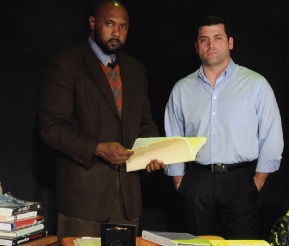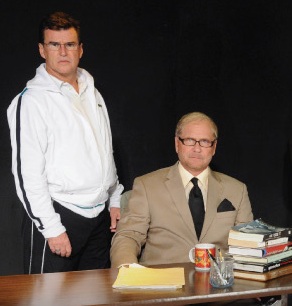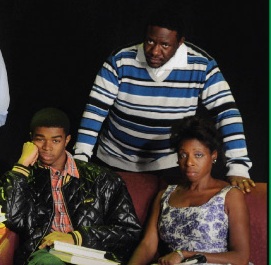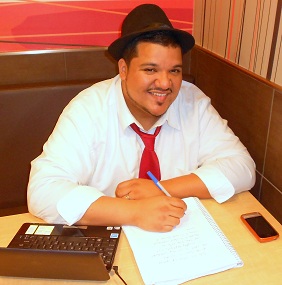
Fathers and Other Strangers, written by Jeffrey Stetson, is a
dramatic piece about the relationship between sons and fathers, the prejudices
between professionals and how bitterness can take root in one's soul and grow
to bear fruit of smoldering anger.
The latest
production of Miami's African-American Performing Arts Community Theatre
centers on a black psychiatrist, Dr. Paul Janis, and his relationship with his
father, his clients and his own white psychiatrist. It details the dynamics
that accompany each relationship.
Finley
Polynice plays Paul, an intensely troubled man who harbors anger for the things
his father didn't do. Paul's bitterness oozes out onto all his clients and his psychiatrist
because, for no other reason except, they're white. White people remind him of
the people that failed to treat his hard-working father with dignity.
Dr. Doug
Angoff, played by Glen Lawrence, is Paul's white psychiatrist who makes vain
attempt after vain attempt to try to get Paul to face his bitterness head on.
The chemistry between the two on stage was ostensible. It's almost as if Polynice
enjoyed the exchanges with his character and Lawrence's.
Lawrence, however, stole the show
as the kooky white psychiatrist. At one point, after intermission, Lawrence's
sweater was buttoned incorrectly, which gave Dr. Angoff a frumpy, sloppy look.
Whether that was intentional or not, it was a perfect compliment to Dr.
Angoff's silly and playful antics.
At the
onset, Polynice seemed very calculated in his role as Paul yet the more the
play moved along, the more comfortable he became. It didn't seem very natural
when he dropped F-bombs and other choice curse words. He almost toned his voice
down to say them with the least amount of discomfort. As the play continued, however,
the swearing didn't seem as stilted and measured.
In fact, I don't feel like this
play needed any curse words, even to convey anger, but they came out
effortlessly nevertheless. I just wondered if the kids in the lobby selling
snacks could hear Paul's rants.
 Soon, we are
introduced to several of Paul's patients. First up to bat was James Stefano
(René Granado) who plays a well-off white American yet he sounds like a Cuban
from Hialeah, Florida (I later found out he was). James has issues with his
wife and kids. The dialogue between the two did not fully capture my attention,
though I will admit, it caught my attention when the two shared a fake joint.
Soon, we are
introduced to several of Paul's patients. First up to bat was James Stefano
(René Granado) who plays a well-off white American yet he sounds like a Cuban
from Hialeah, Florida (I later found out he was). James has issues with his
wife and kids. The dialogue between the two did not fully capture my attention,
though I will admit, it caught my attention when the two shared a fake joint.
Then, Paul sees another white
patient by the name of Mr. Davis. Mr.
Davis, played by Harold Clinton Archumbault, was very convincing as an anal-retentive
rich white man. This actor would be an easy cast in any Hollywood movie as the
same stereotype. Out of all the characters, I felt the most sympathy for Davis
because he received the brunt of Paul Janis' frustrations, though it's
questionable if he truly deserved it. In my opinion, I felt James Stefano
deserved it more.
Alas, Paul does get to treat black
patients, yet only as a favor to someone he knows. A family of three, Mr.
Nelson (Cedric the Entertainer
look-alike Jon David K) is struggling with his relationship with his rebellious
son Edward, played by the charismatic Curtis Holland. I inwardly begged Jon
David K to pull out the eyeglasses and hat and break out into stand-up comedy
routine. Deidre Washington played a believable doting mother in the role of
Mrs. Nelson.
The Nelsons reach out to Dr. Janis
to receive counsel for their rebellious son who was ultimately maimed by his
first experience with racism. He was chased away by the father of a white
classmate for whom he had romantic feelings. I know friends who have
experienced similar racism so that part wasn't difficult to buy.
My problem wasn't with the actors
or the director. It was with the playwright. The writing barely squeezed any
sympathy out of me for these characters, except the anal white guy. Sometimes
that's a result of poor performances, but these actors were not a less than
average group. They were solid actors.
When it comes to scripts, I want to BELIEVE in what you're telling me. I don't care if you're writing about Alien Potatoes attacking cone-headed people, good writing will make me believe in an Alien Potato conspiracy. Though Paul explains his anger and his disdain for white clients, to me, were they enough to merit these reactions from him?
I've seen white people make some borderline comments when hanging out with them. But were they racist? No. Ignorant? Probably. But again, I've heard dumb comments from black people, too. I've been called a Puerto Rican and a Mexican in a degrading tone by black and white people and I'm neither nationality. My father has also had his unfair share of racist taunts but I don't fault the man for not beginning a revolution on the Texas border.
 Stetson could have written in some
flashback moments between Paul (as a child) and his father. Gather two extra
actors and have a simple re-enactment of what Paul was referring to in his
expletive-filled tirades. I could HEAR Paul's disappointment with his father
but I would have rather SEEN it. He begged for his dad to punch like Mike Tyson
"just once." But, show me exactly what his father had to endure that served to
mold Paul into an irate black man seeking the help of a white psychiatrist.
Stetson could have written in some
flashback moments between Paul (as a child) and his father. Gather two extra
actors and have a simple re-enactment of what Paul was referring to in his
expletive-filled tirades. I could HEAR Paul's disappointment with his father
but I would have rather SEEN it. He begged for his dad to punch like Mike Tyson
"just once." But, show me exactly what his father had to endure that served to
mold Paul into an irate black man seeking the help of a white psychiatrist.
I often wondered what decade we were
in with the situations that came into play. I don't know if I'd make any racial
slurs about white people if the doctor who was treating me was white. "Don't
bite the hand that feeds you" type of thing, ya know? Neither would I return to my psychiatrist if he hated
me because of my skin color and cursed me out. Again, I'm not a psychologist
but I have a hard time believing a client would return to a psychiatrist who
berates him spitefully, fair or not.
Racism will always turn into a
plethora of compelling fact-based scripts but this one yielded a brief second where
my wife nudged me because she THOUGHT I was sleeping. Given a better script, my
wife wouldn't have to suspect that happening next time.
All in all, the acting in Fathers and Other Strangers was solid which gives credit to
the talented cast and director Teddy Harrell, Jr., but a few more tweaks to
justify Paul's rage by Stetson would have sufficed.

The self-proclaimed Zig Ziglar of rap,
Billy Delgado, is a Music Producer/Artist and Writer by day and sleeping
pillow-drooler by night. He is currently producing the debut album for his band
The 288's, a God-inspired Hip Hop/R&B group that combines soul-baring
lyricism with an electric innovative sound, breaking from the norm and reaching
all cultures & ages (save senior citizens). He still can't believe he's
a family man with a beautiful wife Mari & three boys Chris, Nelson and
Joshua, so he continues to pinch himself silly to this day.

